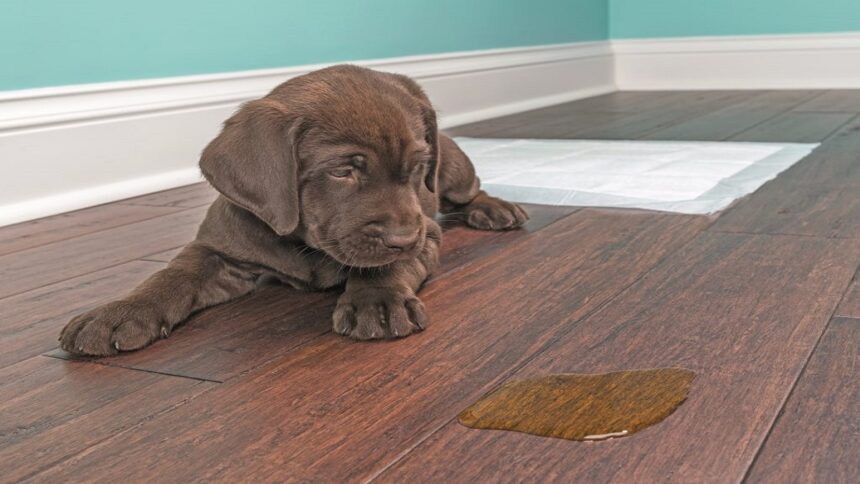Effective Ways To Eliminate Pet Urine Odor From Wood Floors
We love our pets, but accidents happen. When pet urine gets onto wood floors, it can leave behind an unpleasant odor that’s tough to get rid of. Unlike other surfaces, wood can absorb the urine, causing the smell to linger. If not treated quickly, pet urine can not only stain the wood but also lead to long-lasting odor problems.
In this guide, we’ll talk about how to remove pet urine odor from wood floors effectively. We’ll cover some simple methods to try at home. We’ll also discuss when to call in pros to remove odors and restore your wood floors.
Understanding How Pet Urine Affects Wood Floors
When a pet urinates on wood floors, the liquid doesn’t just sit on the surface. Because wood is porous, urine can seep into the grain, allowing it to penetrate deeper into the floor. This causes not only visible stains but also bad odors that stick around for a long time if not addressed quickly.
The smell of pet urine comes from bacteria and uric acid crystals in the urine. These crystals get absorbed into the wood grain and can be difficult to clean. If left untreated, the stains may darken over time, making them even harder to remove. Using the right pet urine odor remover and acting quickly can make a huge difference in preventing long-term damage and odors.
Immediate Steps To Take After An Accident
If you notice your pet has had an accident on your wood floor, it’s important to act fast. The quicker you respond, the less chance the urine will have to soak into the wood and cause a lasting odor.
Blot The Urine Right Away
As soon as you see the accident, grab a paper towel or a clean cloth and start blotting the area. Press down gently to absorb as much of the liquid as possible, but avoid scrubbing. Scrubbing can push the urine deeper into the wood grain, making it harder to remove the smell later.
Use A Pet Urine Odor Remover
After blotting, it’s important to clean the area thoroughly. Using a pet urine odor remover can help neutralize the odor and prevent it from setting into the wood. These products are specially designed to break down the components of urine that cause stains and smells.
DIY Methods For Removing Pet Urine Odor
If you’re looking for natural and effective ways to get rid of pet urine odor on wood floors, several DIY methods can work well. Here are three popular techniques that are easy to try at home.
Vinegar And Baking Soda Solution
One of the simplest solutions for pet odor removal is a mixture of vinegar and baking soda. Vinegar is a natural cleaner and deodorizer, while baking soda absorbs odors.
- How to Use It: Mix equal parts white vinegar and water in a spray bottle. Spray the affected area lightly and allow it to sit for a few minutes. After that, sprinkle baking soda over the vinegar-treated area. Let the baking soda sit for a few hours (or overnight, if possible) before vacuuming it up. This method works well for minor odors and stains.
Hydrogen Peroxide Method
Hydrogen peroxide is another powerful tool for removing pet urine odors. It can help break down the urine crystals and lift stains from the wood without damaging the finish.
- How to Use It: Mix hydrogen peroxide with a small amount of dish soap. Apply the solution to the stained area using a cloth, and let it sit for 15-20 minutes. Afterward, blot the area with a clean cloth and allow it to dry completely.
Enzymatic Cleaners
Enzymatic cleaners are specially designed to break down the proteins in pet urine that cause odors. These cleaners use natural enzymes to target and neutralize the smell at its source.
- How to Use It: Follow the instructions on the cleaner’s label. Typically, you’ll spray the cleaner directly on the affected area, let it sit for a set amount of time, and then wipe it away. Enzymatic cleaners are particularly effective for deep-seated odors and are a great option for long-term pet odor removal.
Deep Cleaning For Stubborn Odors
In some cases, pet urine odor may be so deep in the wood that regular cleaning methods don’t fully remove the smell. When this happens, it may be time to consider more intensive cleaning solutions.
Sanding The Floor
If the odor persists after surface cleaning, you may need to sand the wood floor lightly. Sanding removes the top layer of wood where the urine may have penetrated. Be sure to use a fine-grit sandpaper and work carefully to avoid damaging the floor.
Refinishing The Wood Floor
If sanding doesn’t fully remove the odor, refinishing the wood might be necessary. Refinishing involves sanding the floor down to the raw wood and applying a new finish to seal and protect it. This method can be a bit more labor-intensive but can completely eliminate the smell if done correctly.
For tough cases, you might want to reach out to professional odor removal services. They have the tools and expertise to handle difficult odors that DIY methods can’t fully resolve.
Preventing Future Odors
To prevent future pet urine odors from becoming a problem, there are a few proactive steps you can take to protect your wood floors.
Use Pet-Friendly Sealants
Applying a pet-friendly sealant or floor coating can create a barrier that prevents urine from soaking into the wood. These sealants are water-resistant and help protect your floors from future accidents.
Regular Cleaning Routine
Keep your floors clean by wiping up any spills or accidents right away. A regular cleaning routine can help you catch any hidden spots before they become bigger problems.
Use Pet Pads Or Training
If your pet is prone to accidents, consider using training pads in areas where they spend a lot of time. These pads can absorb the urine before it reaches your wood floors, making cleanup easier.
When To Call A Professional
Sometimes, despite your best efforts, the odor may still linger. In cases like this, it’s a good idea to call professional odor removal services. Professionals have tools and cleaners that can remove tough odors.
Professional Refinishing
If your wood floors have deep stains and odors, professionals can sand and refinish them. This will remove the affected layers and apply a new finish. This can restore your floors to their original condition and get rid of any lingering smells.
Deep Cleaning Services
Professionals also offer deep cleaning services that go beyond surface cleaning. They can treat the wood with industrial-grade cleaners. These cleaners penetrate deep into the grain, neutralizing odors that regular methods can’t reach.
Final Tips For Keeping Wood Floors Pet-Odor Free
Removing pet urine odor from wood floors can be tough. However, you can keep your floors fresh and beautiful with the right methods and quick action. For small odors, try DIY solutions like vinegar and baking soda, hydrogen peroxide, or enzymatic cleaners. For more stubborn smells, deeper cleaning methods like sanding and refinishing are needed.
For ongoing protection, consider using sealants and maintaining a regular cleaning routine. And if all else fails, don’t hesitate to call in professional odor removal services to ensure your wood floors are fully cleaned and odor-free. By staying on top of pet accidents, you can maintain the beauty and cleanliness of your wood floors for years to come.






